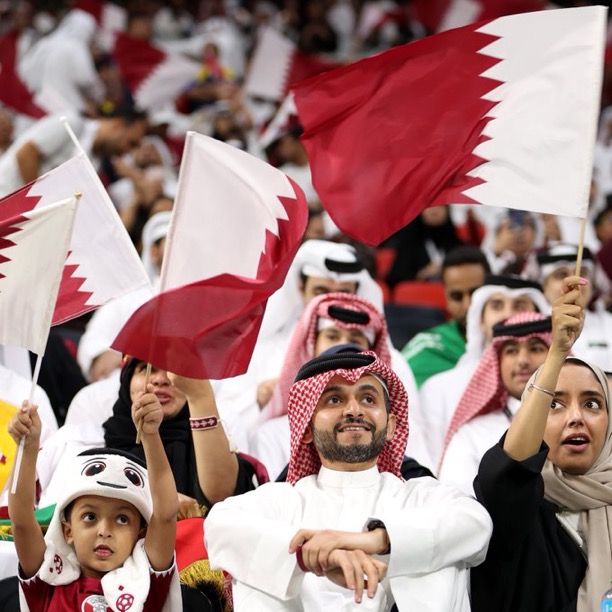
Sports Writer Caitlin McGraw comments on the backlash against Qatar being the host of the World Cup this December
The 2022 FIFA World Cup will kick off on November 20th following over a decade of controversy and backlash since FIFA awarded hosting duties to Qatar, a nation with little football culture and a sweltering climate. Criticisms range from discontent about the disruption to the European domestic leagues, to calls to boycott or relocate the tournament due to corruption, exploitation and deaths.
Western media outlets and human rights organisations increasingly accuse autocratic nations of attempting to ‘sportswash’ their questionable human rights records by involving themselves in sporting competitions, events and clubs. Yet this is a complex claim. Debate rages on regarding the ethics and principles of playing in Qatar, and how players, pundits and fans should respond.
Debate rages on regarding the ethics and principles of playing in Qatar, and how players, pundits and fans should respond
Some fans argue that football is an escape from the stresses of everyday life, a way to channel frustrated energy into supporting a team. Furthermore, FIFA does not award hosting rights based on human rights records (although the decision making process has come under fire for claims of corruption). Yet it is undeniable that sport is political; we regularly see players kneeling in protest of racial inequality and wearing rainbow laces to promote LGBT+ inclusion. These gestures signal the responsibilities players and teams have, with this platform expanded at the World Cup providing the global capacity to unite people through competition.
Qatar’s commitment to improving understanding between East and West by hosting the World Cup has been stunted by outrage about the country’s treatment of migrants, women and LGBT+ people.
Much of the infrastructure required to host the biggest competition in football has been built over the past decade, by 30,000 migrant workers whose labour has been the root of many claims that Qatar’s human rights record is incompatible with hosting the World Cup. The ‘kafala system’ whereby workers’ passports are removed, and they cannot change jobs without the permission of their employer was reformed in 2017 following criticism, but conditions and treatment of migrant workers remains poor due to low (and often unpaid) wages, overcrowded accommodation and dangerous working conditions.
6500 migrant workers have died in Qatar since 2010 (the amount working on World Cup projects is unknown) – some have described the upcoming World Cup as being ‘built on blood’.
6500 migrant workers have died in Qatar since 2010
Qatar is also an authoritarian state, ruled by Sharia law, which restricts the freedoms of citizens (especially women) and criminalises drinking alcohol, swearing and, most notably, homosexuality. This is another point of contention for fans and journalists alike, with football attempting to become a more accepting space for LGBT+ expression. Instead, fans feel endangered travelling to Qatar. UK Foreign Secretary James Cleverly recently told these fans to show ‘flex and compromise’, echoing the Qatari government’s firm statement that laws regarding homosexuality will not be changed and the host’s culture must be respected by visitors.
Protests have been planned to show disapproval, including a video released by the Australian team – a sponsor-less Danish kit which pays tribute to dead migrant workers, and nine European captains who will don a ‘One Love’ rainbow armband. FIFA has not formally approved these ‘political statements’ but trying to silence or depoliticise protests will only evoke further motivation to fight for change rather than a passive acceptance of injustice.
In my opinion, the work of Amnesty International and Human Rights Watch is important in spotlighting continued restrictions in Qatar, and players should use their platform to amplify these messages.
Fans feel endangered travelling to Qatar
There are many permutations to forming an opinion about whether the World Cup should be held in Qatar. Western morals and values contradict supporting any project of an authoritarian, oppressive government which has been built on exploitation and suffering; the guilt and cognitive dissonance associated with watching the World Cup will be unsettling. However, how fair is it to claim the moral high ground over Qatar? Overly negative narratives reinforce orientalist and western centric ideas about Islam and the Middle East as backwards and uncivilised compared to Western standards – which are far from perfect.
So far, no teams have boycotted the tournament, and television ratings will still be in the hundreds of millions once the first ball is kicked. Studies have shown that media attention on political issues will fade once the matches dominate our screens. Therefore, it is important that the costs of this World Cup are kept in public consciousness during, and after, the World Cup to achieve a positive legacy. Yet, it is clear that issues of corruption, unethical sponsorship and state-backed ownership of clubs are issues that will continue to surround the beautiful game long after Qatar.
Check out the latest Sport articles here:
Aston Villa Women make a flying start to WSL campaign
Comments